IT Ethics - Assignment 3: Analyzing Cambridge Analytica Case Study
VerifiedAdded on 2023/01/23
|7
|1357
|93
Report
AI Summary
This report provides an analysis of the Cambridge Analytica scandal from an IT ethics perspective. It begins with an introduction to social media and the importance of data privacy, highlighting the Cambridge Analytica case as a significant example of data leakage and ethical breaches. The report then delves into ethical theories, including Utilitarianism, Deontology, Virtue Theory, and Contract Theory, applying each to the Cambridge Analytica case to assess the ethical implications of Facebook's actions and the actions of Cambridge Analytica. The report concludes that Facebook's actions were unethical according to these ethical frameworks, emphasizing the need for stricter regulations, ethical guidelines for companies, and increased awareness among the public to prevent such scandals in the future. References are provided to support the analysis.

IT Ethics
Paraphrase This Document
Need a fresh take? Get an instant paraphrase of this document with our AI Paraphraser
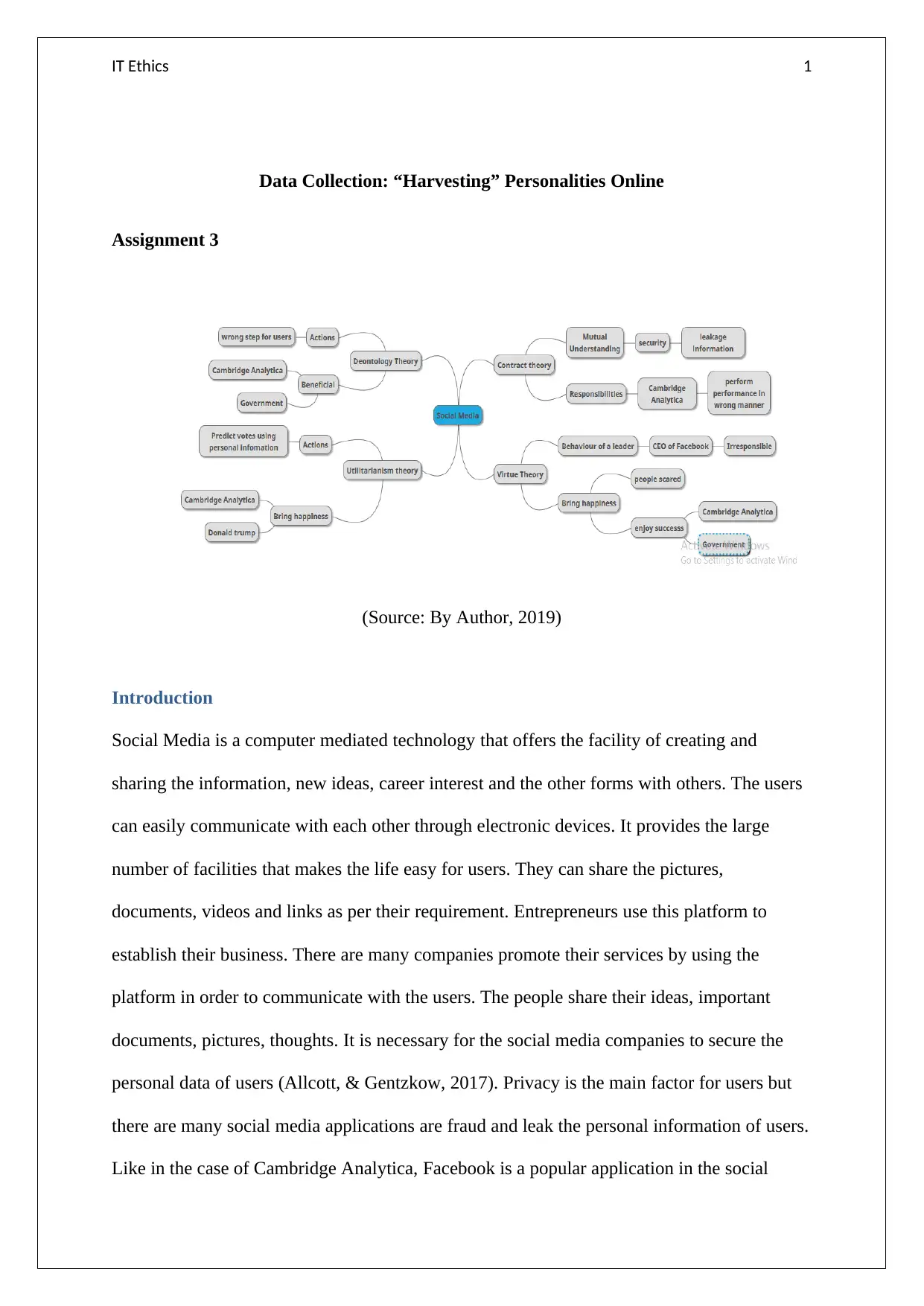
IT Ethics 1
Data Collection: “Harvesting” Personalities Online
Assignment 3
(Source: By Author, 2019)
Introduction
Social Media is a computer mediated technology that offers the facility of creating and
sharing the information, new ideas, career interest and the other forms with others. The users
can easily communicate with each other through electronic devices. It provides the large
number of facilities that makes the life easy for users. They can share the pictures,
documents, videos and links as per their requirement. Entrepreneurs use this platform to
establish their business. There are many companies promote their services by using the
platform in order to communicate with the users. The people share their ideas, important
documents, pictures, thoughts. It is necessary for the social media companies to secure the
personal data of users (Allcott, & Gentzkow, 2017). Privacy is the main factor for users but
there are many social media applications are fraud and leak the personal information of users.
Like in the case of Cambridge Analytica, Facebook is a popular application in the social
Data Collection: “Harvesting” Personalities Online
Assignment 3
(Source: By Author, 2019)
Introduction
Social Media is a computer mediated technology that offers the facility of creating and
sharing the information, new ideas, career interest and the other forms with others. The users
can easily communicate with each other through electronic devices. It provides the large
number of facilities that makes the life easy for users. They can share the pictures,
documents, videos and links as per their requirement. Entrepreneurs use this platform to
establish their business. There are many companies promote their services by using the
platform in order to communicate with the users. The people share their ideas, important
documents, pictures, thoughts. It is necessary for the social media companies to secure the
personal data of users (Allcott, & Gentzkow, 2017). Privacy is the main factor for users but
there are many social media applications are fraud and leak the personal information of users.
Like in the case of Cambridge Analytica, Facebook is a popular application in the social
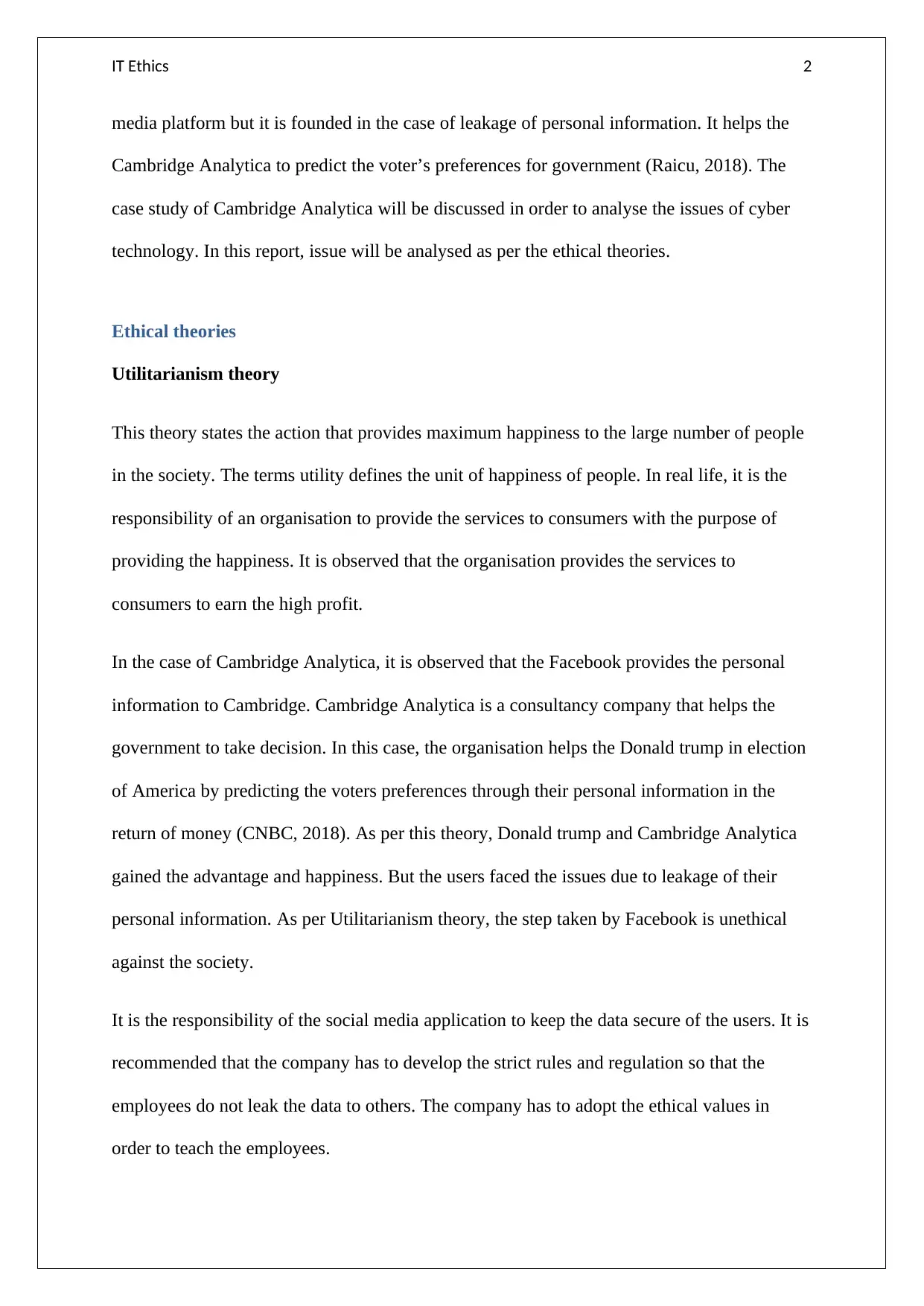
IT Ethics 2
media platform but it is founded in the case of leakage of personal information. It helps the
Cambridge Analytica to predict the voter’s preferences for government (Raicu, 2018). The
case study of Cambridge Analytica will be discussed in order to analyse the issues of cyber
technology. In this report, issue will be analysed as per the ethical theories.
Ethical theories
Utilitarianism theory
This theory states the action that provides maximum happiness to the large number of people
in the society. The terms utility defines the unit of happiness of people. In real life, it is the
responsibility of an organisation to provide the services to consumers with the purpose of
providing the happiness. It is observed that the organisation provides the services to
consumers to earn the high profit.
In the case of Cambridge Analytica, it is observed that the Facebook provides the personal
information to Cambridge. Cambridge Analytica is a consultancy company that helps the
government to take decision. In this case, the organisation helps the Donald trump in election
of America by predicting the voters preferences through their personal information in the
return of money (CNBC, 2018). As per this theory, Donald trump and Cambridge Analytica
gained the advantage and happiness. But the users faced the issues due to leakage of their
personal information. As per Utilitarianism theory, the step taken by Facebook is unethical
against the society.
It is the responsibility of the social media application to keep the data secure of the users. It is
recommended that the company has to develop the strict rules and regulation so that the
employees do not leak the data to others. The company has to adopt the ethical values in
order to teach the employees.
media platform but it is founded in the case of leakage of personal information. It helps the
Cambridge Analytica to predict the voter’s preferences for government (Raicu, 2018). The
case study of Cambridge Analytica will be discussed in order to analyse the issues of cyber
technology. In this report, issue will be analysed as per the ethical theories.
Ethical theories
Utilitarianism theory
This theory states the action that provides maximum happiness to the large number of people
in the society. The terms utility defines the unit of happiness of people. In real life, it is the
responsibility of an organisation to provide the services to consumers with the purpose of
providing the happiness. It is observed that the organisation provides the services to
consumers to earn the high profit.
In the case of Cambridge Analytica, it is observed that the Facebook provides the personal
information to Cambridge. Cambridge Analytica is a consultancy company that helps the
government to take decision. In this case, the organisation helps the Donald trump in election
of America by predicting the voters preferences through their personal information in the
return of money (CNBC, 2018). As per this theory, Donald trump and Cambridge Analytica
gained the advantage and happiness. But the users faced the issues due to leakage of their
personal information. As per Utilitarianism theory, the step taken by Facebook is unethical
against the society.
It is the responsibility of the social media application to keep the data secure of the users. It is
recommended that the company has to develop the strict rules and regulation so that the
employees do not leak the data to others. The company has to adopt the ethical values in
order to teach the employees.
⊘ This is a preview!⊘
Do you want full access?
Subscribe today to unlock all pages.

Trusted by 1+ million students worldwide
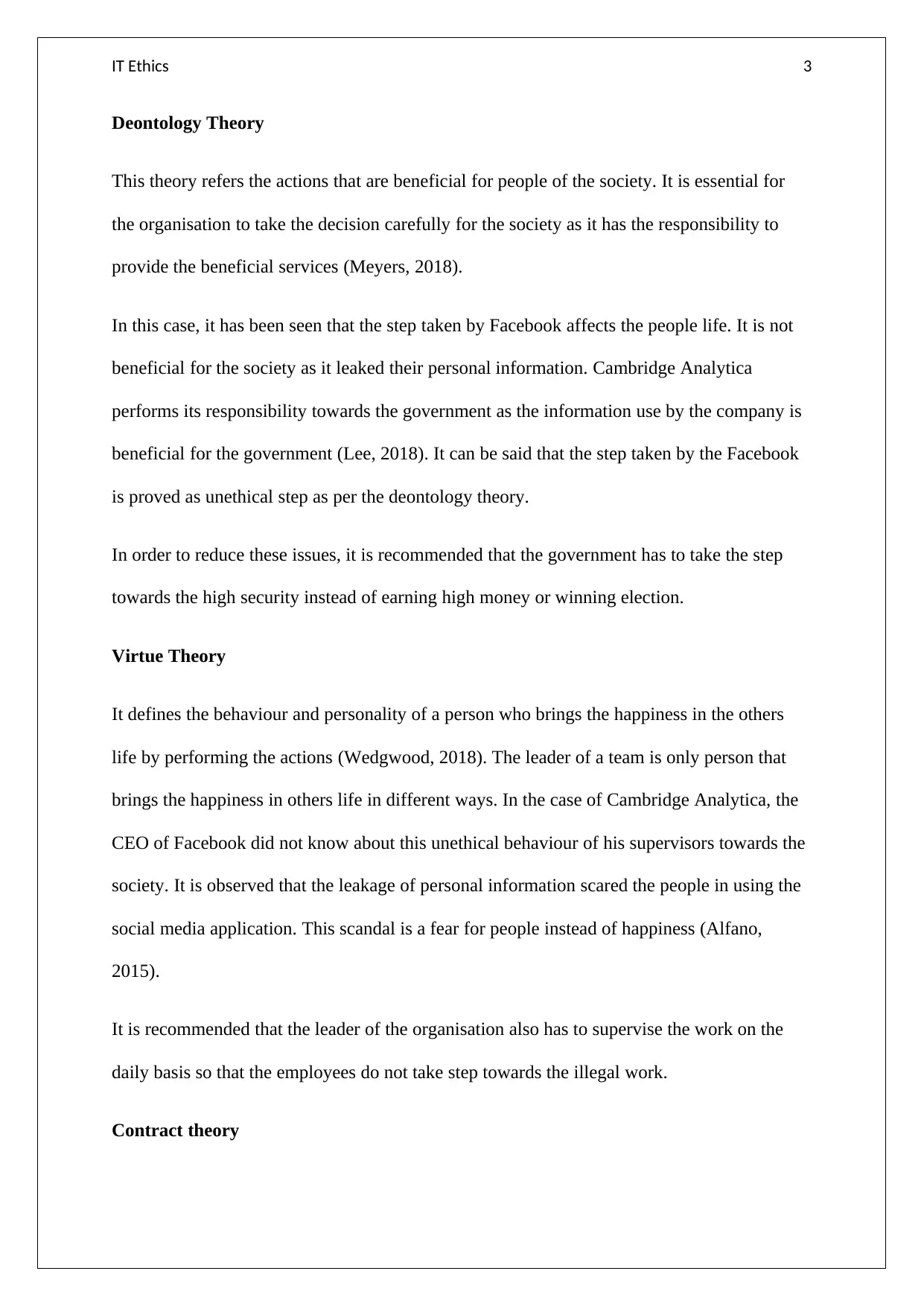
IT Ethics 3
Deontology Theory
This theory refers the actions that are beneficial for people of the society. It is essential for
the organisation to take the decision carefully for the society as it has the responsibility to
provide the beneficial services (Meyers, 2018).
In this case, it has been seen that the step taken by Facebook affects the people life. It is not
beneficial for the society as it leaked their personal information. Cambridge Analytica
performs its responsibility towards the government as the information use by the company is
beneficial for the government (Lee, 2018). It can be said that the step taken by the Facebook
is proved as unethical step as per the deontology theory.
In order to reduce these issues, it is recommended that the government has to take the step
towards the high security instead of earning high money or winning election.
Virtue Theory
It defines the behaviour and personality of a person who brings the happiness in the others
life by performing the actions (Wedgwood, 2018). The leader of a team is only person that
brings the happiness in others life in different ways. In the case of Cambridge Analytica, the
CEO of Facebook did not know about this unethical behaviour of his supervisors towards the
society. It is observed that the leakage of personal information scared the people in using the
social media application. This scandal is a fear for people instead of happiness (Alfano,
2015).
It is recommended that the leader of the organisation also has to supervise the work on the
daily basis so that the employees do not take step towards the illegal work.
Contract theory
Deontology Theory
This theory refers the actions that are beneficial for people of the society. It is essential for
the organisation to take the decision carefully for the society as it has the responsibility to
provide the beneficial services (Meyers, 2018).
In this case, it has been seen that the step taken by Facebook affects the people life. It is not
beneficial for the society as it leaked their personal information. Cambridge Analytica
performs its responsibility towards the government as the information use by the company is
beneficial for the government (Lee, 2018). It can be said that the step taken by the Facebook
is proved as unethical step as per the deontology theory.
In order to reduce these issues, it is recommended that the government has to take the step
towards the high security instead of earning high money or winning election.
Virtue Theory
It defines the behaviour and personality of a person who brings the happiness in the others
life by performing the actions (Wedgwood, 2018). The leader of a team is only person that
brings the happiness in others life in different ways. In the case of Cambridge Analytica, the
CEO of Facebook did not know about this unethical behaviour of his supervisors towards the
society. It is observed that the leakage of personal information scared the people in using the
social media application. This scandal is a fear for people instead of happiness (Alfano,
2015).
It is recommended that the leader of the organisation also has to supervise the work on the
daily basis so that the employees do not take step towards the illegal work.
Contract theory
Paraphrase This Document
Need a fresh take? Get an instant paraphrase of this document with our AI Paraphraser
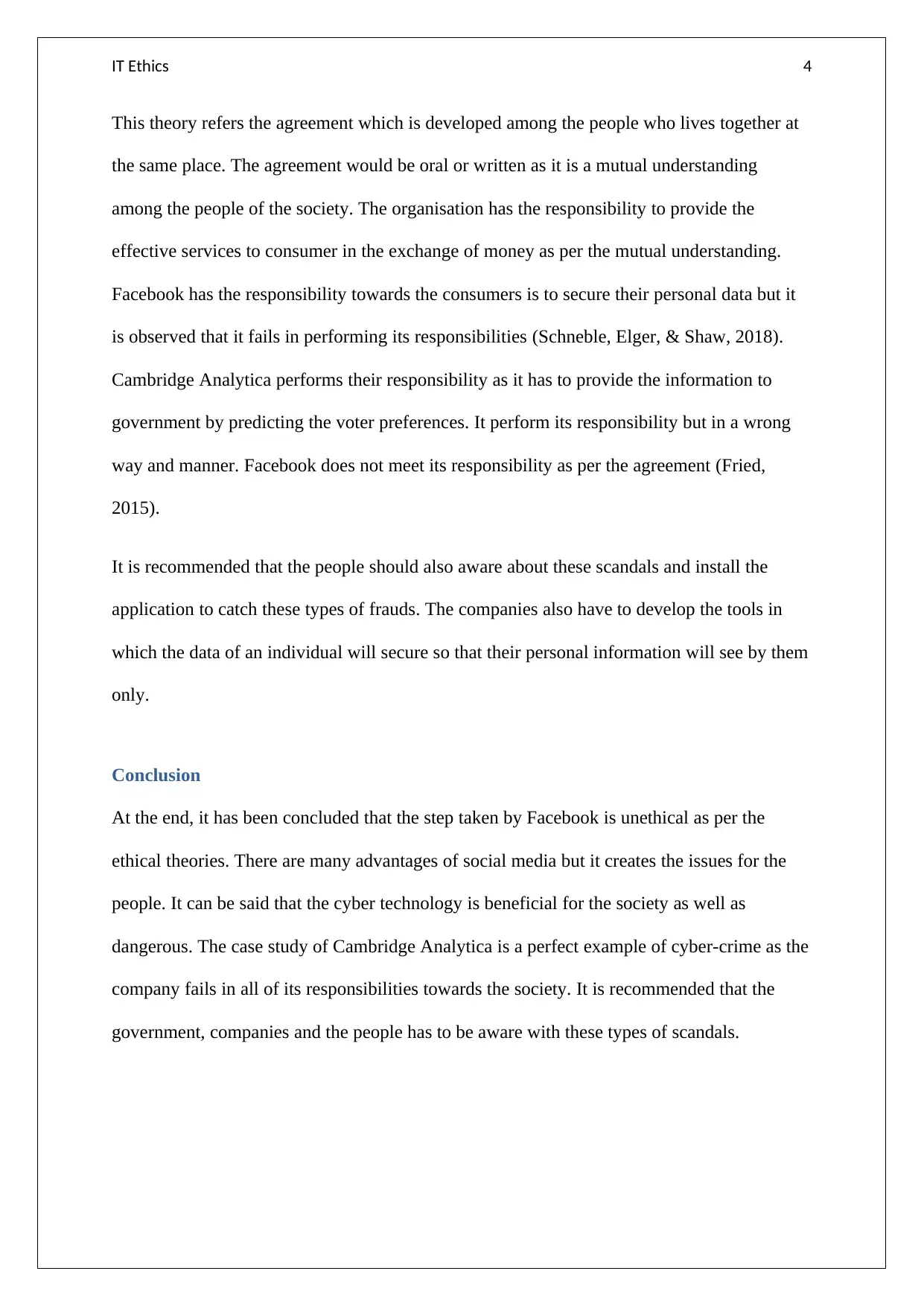
IT Ethics 4
This theory refers the agreement which is developed among the people who lives together at
the same place. The agreement would be oral or written as it is a mutual understanding
among the people of the society. The organisation has the responsibility to provide the
effective services to consumer in the exchange of money as per the mutual understanding.
Facebook has the responsibility towards the consumers is to secure their personal data but it
is observed that it fails in performing its responsibilities (Schneble, Elger, & Shaw, 2018).
Cambridge Analytica performs their responsibility as it has to provide the information to
government by predicting the voter preferences. It perform its responsibility but in a wrong
way and manner. Facebook does not meet its responsibility as per the agreement (Fried,
2015).
It is recommended that the people should also aware about these scandals and install the
application to catch these types of frauds. The companies also have to develop the tools in
which the data of an individual will secure so that their personal information will see by them
only.
Conclusion
At the end, it has been concluded that the step taken by Facebook is unethical as per the
ethical theories. There are many advantages of social media but it creates the issues for the
people. It can be said that the cyber technology is beneficial for the society as well as
dangerous. The case study of Cambridge Analytica is a perfect example of cyber-crime as the
company fails in all of its responsibilities towards the society. It is recommended that the
government, companies and the people has to be aware with these types of scandals.
This theory refers the agreement which is developed among the people who lives together at
the same place. The agreement would be oral or written as it is a mutual understanding
among the people of the society. The organisation has the responsibility to provide the
effective services to consumer in the exchange of money as per the mutual understanding.
Facebook has the responsibility towards the consumers is to secure their personal data but it
is observed that it fails in performing its responsibilities (Schneble, Elger, & Shaw, 2018).
Cambridge Analytica performs their responsibility as it has to provide the information to
government by predicting the voter preferences. It perform its responsibility but in a wrong
way and manner. Facebook does not meet its responsibility as per the agreement (Fried,
2015).
It is recommended that the people should also aware about these scandals and install the
application to catch these types of frauds. The companies also have to develop the tools in
which the data of an individual will secure so that their personal information will see by them
only.
Conclusion
At the end, it has been concluded that the step taken by Facebook is unethical as per the
ethical theories. There are many advantages of social media but it creates the issues for the
people. It can be said that the cyber technology is beneficial for the society as well as
dangerous. The case study of Cambridge Analytica is a perfect example of cyber-crime as the
company fails in all of its responsibilities towards the society. It is recommended that the
government, companies and the people has to be aware with these types of scandals.
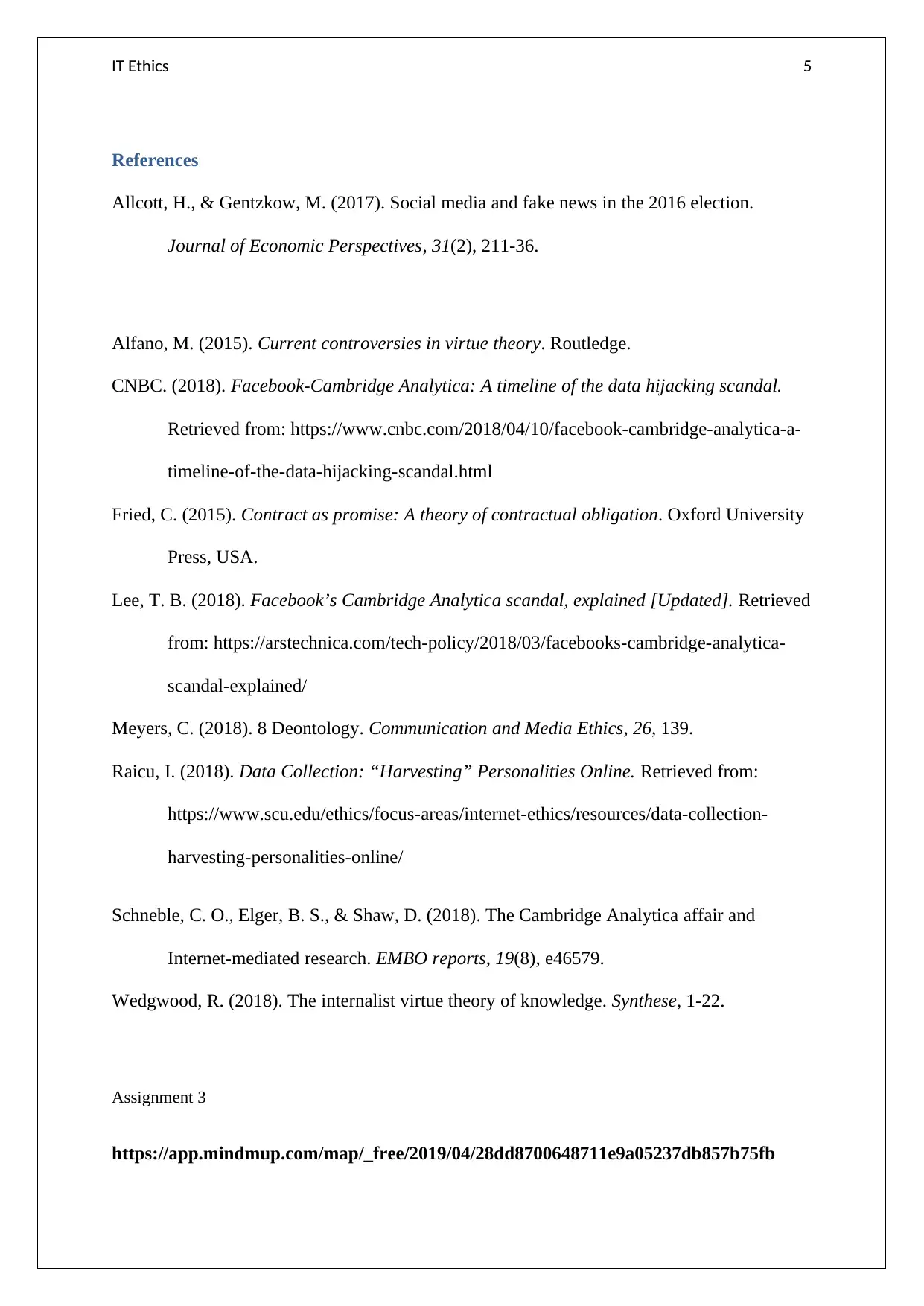
IT Ethics 5
References
Allcott, H., & Gentzkow, M. (2017). Social media and fake news in the 2016 election.
Journal of Economic Perspectives, 31(2), 211-36.
Alfano, M. (2015). Current controversies in virtue theory. Routledge.
CNBC. (2018). Facebook-Cambridge Analytica: A timeline of the data hijacking scandal.
Retrieved from: https://www.cnbc.com/2018/04/10/facebook-cambridge-analytica-a-
timeline-of-the-data-hijacking-scandal.html
Fried, C. (2015). Contract as promise: A theory of contractual obligation. Oxford University
Press, USA.
Lee, T. B. (2018). Facebook’s Cambridge Analytica scandal, explained [Updated]. Retrieved
from: https://arstechnica.com/tech-policy/2018/03/facebooks-cambridge-analytica-
scandal-explained/
Meyers, C. (2018). 8 Deontology. Communication and Media Ethics, 26, 139.
Raicu, I. (2018). Data Collection: “Harvesting” Personalities Online. Retrieved from:
https://www.scu.edu/ethics/focus-areas/internet-ethics/resources/data-collection-
harvesting-personalities-online/
Schneble, C. O., Elger, B. S., & Shaw, D. (2018). The Cambridge Analytica affair and
Internet‐mediated research. EMBO reports, 19(8), e46579.
Wedgwood, R. (2018). The internalist virtue theory of knowledge. Synthese, 1-22.
Assignment 3
https://app.mindmup.com/map/_free/2019/04/28dd8700648711e9a05237db857b75fb
References
Allcott, H., & Gentzkow, M. (2017). Social media and fake news in the 2016 election.
Journal of Economic Perspectives, 31(2), 211-36.
Alfano, M. (2015). Current controversies in virtue theory. Routledge.
CNBC. (2018). Facebook-Cambridge Analytica: A timeline of the data hijacking scandal.
Retrieved from: https://www.cnbc.com/2018/04/10/facebook-cambridge-analytica-a-
timeline-of-the-data-hijacking-scandal.html
Fried, C. (2015). Contract as promise: A theory of contractual obligation. Oxford University
Press, USA.
Lee, T. B. (2018). Facebook’s Cambridge Analytica scandal, explained [Updated]. Retrieved
from: https://arstechnica.com/tech-policy/2018/03/facebooks-cambridge-analytica-
scandal-explained/
Meyers, C. (2018). 8 Deontology. Communication and Media Ethics, 26, 139.
Raicu, I. (2018). Data Collection: “Harvesting” Personalities Online. Retrieved from:
https://www.scu.edu/ethics/focus-areas/internet-ethics/resources/data-collection-
harvesting-personalities-online/
Schneble, C. O., Elger, B. S., & Shaw, D. (2018). The Cambridge Analytica affair and
Internet‐mediated research. EMBO reports, 19(8), e46579.
Wedgwood, R. (2018). The internalist virtue theory of knowledge. Synthese, 1-22.
Assignment 3
https://app.mindmup.com/map/_free/2019/04/28dd8700648711e9a05237db857b75fb
⊘ This is a preview!⊘
Do you want full access?
Subscribe today to unlock all pages.

Trusted by 1+ million students worldwide

IT Ethics 6
1 out of 7
Related Documents
Your All-in-One AI-Powered Toolkit for Academic Success.
+13062052269
info@desklib.com
Available 24*7 on WhatsApp / Email
![[object Object]](/_next/static/media/star-bottom.7253800d.svg)
Unlock your academic potential
Copyright © 2020–2026 A2Z Services. All Rights Reserved. Developed and managed by ZUCOL.





